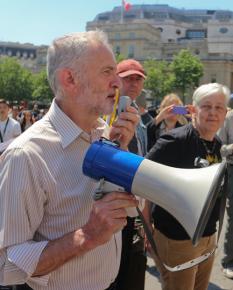Upsetting the Labour elite
Belfast Telegraph columnist explains why left-wing Labour candidate Jeremy Corbyn is shaking up the party.
SUPPORTERS OF the left-wing candidate Jeremy Corbyn in the Labour Party leadership contest point out that, far from being out of tune with the electorate, most of the "unpopular" policies which critics say would make a Corbyn-led party unelectable are, in fact, rather popular with the mass of the people. Take state ownership of public services.
Corbyn has pledged that, under his leadership, Labour would go into the 2020 election pledged to end the piecemeal privatization of the health service and to renationalize services sold off to private investors by Tory and New Labour governments.
But, say supporters of the three charisma-bypass candidates, this is a throwback to the bad old days when union barons and left-wing constituency parties doomed Labour to long years of opposition.
This proposition has become conventional wisdom. Virtually every commentator in the land hammers it home day in and day out: you can only win with policies that appeal to the center ground.
Corbyn's approach is sheer madness, a death wish, suicide note, irresponsible, adolescent, Disneyland politics, hopelessly deluded, indicative of a need for a head transplant (all phrases taken from newspapers in the last seven days).

Invariably the articles go on to sketch the outline of the center ground and spell out what policies are likely to win the confidence of this--as we have to call it these days--demographic.
Corbyn supporters point out in response that this assumption is contradicted by the polls. Of course, the May election exposed the polls as unreliable. But the snapshots of current opinion consistently reveal a wider gap between opinion polls and actual polls than anything we can glean from the election figures.
A YouGov poll in March found that the electorate wants hospitals in public rather than private ownership by 74 percent to 18 percent; on roads by 62 percent to 25 percent; on prisons, 62 percent to 22 percent; schools, 62 percent to 3 percent; the post, 54 percent to 27 percent; railways, 52 percent to 27 percent; electricity, gas and water, 47 percent to 30 percent. Banks were the only sector in which private was preferred to public--31 percent to 27 percent.
THERE'S NOTHING new about this. The railways were nationalized by Attlee's government in 1948, reprivatized under John Major in 1993. The Labour Party pledged immediately to reverse the privatization. John Prescott told the party conference in October 1993: "Let me make it crystal clear...the railway system will...be returned to public ownership."
The following year's conference was told by transport spokesman Frank Dobson: "Let me give this pledge...the next Labour government will bring the railway system back into public ownership." A further year on, new spokesman Michael Meacher told potential investors they'd be making a big mistake by buying shares in a company certain to be renationalized as soon as Labour returned to office: "If you want to buy a pig in a poke, then it's up to you. But don't come crying to me when it all ends in tears."
Tony Blair told the same conference, the last before the general election: "To anyone thinking of grabbing our railways...I say this: there will be a publicly owned and publicly accountable railway system under a Labour government."
In the manifesto for the 1997 general election this had been reduced to: "A modern, integrated transport system built in partnership between public and private finance." In fact, the system stayed entirely private.
Challenged about the U-turn in March 1998, Prescott declared: "The privatized railway is producing windfall profits for a few people...there is nothing I can do about that."
Over and over again Labour had promised renationalization. And the polls stayed steady throughout, correctly predicting a Blair landslide. It cannot have been the switch in policy that delivered Labour its thumping majority. The change came after he'd been voted in.
Had Blair not dumped the policies he had been elected on, Press moguls like Murdoch would have unleashed the attack dogs. As it was, knowing that they had the measure of the man, not only the liberal press like the Guardian and Independent, but the Times, the Sun, Financial Times and the Economist buttressed Blair for most of the next 10 years.
The same media have already shown, that, if elected they would have Corbyn torn apart. A majority of Labour MPs abstained last week on Tory cuts which differentially damage the poor. What they crave is the blessing of the banks, the finance houses and the Daily Mail.
The big-money interests won't abide a government seriously intent on taking them on. We can assume nothing about the Labour contest, or what Corbyn would do if elected. But he has thrown a scare across the unaccountable elite. Which is more than Curly, Larry and Moe have managed. People are more radical than the mainstream in politics dare think.
First published in the Belfast Telegraph.


